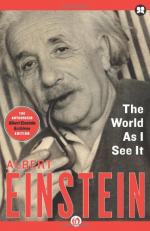
|
| Name: _________________________ | Period: ___________________ |
This test consists of 15 multiple choice questions and 5 short answer questions.
Multiple Choice Questions
1. According to Einstein from where does true scientific research draw its spiritual sustenance?
(a) from the book of Leviticus.
(b) from a sense of a Higher Power.
(c) from the Psalms.
(d) from the Talmud.
2. Why had the Prussian Academy of Sciences confidently expected Einstein to defend Germany?
(a) because he had belonged to the Academy for a long time.
(b) because he would put his scientific connections first.
(c) because he would fear them.
(d) because he didn't want to be thrown out of the Academy.
3. In Einstein's opinion with what is Judaism almost exclusively concerned?
(a) loyalty to theology of Judaism.
(b) creating a Jewish nation.
(c) the moral attitude in life and to life.
(d) excellency in every direction.
4. What does Judaism insist on concerning all living things, especially humans, according to Einstein?
(a) hope.
(b) solidarity.
(c) compassion.
(d) joy.
5. At the beginning of Part III Einstein stated that hoped the principles of what great Germans would again prevail in Germany sometime in the future?
(a) Lessing and Thomas Mann.
(b) Hegel and Heine.
(c) Kant and Goethe.
(d) Schiller and Schopenhauer.
6. What was needed in order to preserve Jewish solidarity?
(a) hope and faith.
(b) the brotherhood of Jews.
(c) hard work.
(d) a spiritual center.
7. What did Einstein consider would have been the repudiation of all the notions of justice and liberty for which he stood all his life?
(a) becoming political since he felt politicians were corrupt.
(b) disowning his Jewish heritage.
(c) giving up his German citizenship.
(d) putting a "good word" in for the German people in 1933.
8. On what date did Einstein write an answer to the Prussian Academy's statement against him?
(a) April 12, 1933.
(b) April 15, 1933.
(c) April 5, 1933.
(d) April 5, 1934.
9. What reason did Einstein give for resigning from The Prussian Academy of Sciences?
(a) He was a Jew.
(b) He was immigrating to America.
(c) He wasn't treated with enough civility.
(d) He didn't want to support the destruction of German culture.
10. What is the Jewish God according to Einstein?
(a) a negation of superstition.
(b) A God made in man's likeness.
(c) a mighty and fearful power.
(d) Abraham's and all Jews' father.
11. What was the official date of Einstein's resignation from the Prussian Academy of Sciences?
(a) March 28, 1933.
(b) March 30, 1933.
(c) March 8, 1933.
(d) March 27, 1933.
12. What should Jewish youth take an interest in according to Einstein?
(a) education but also athletics.
(b) science.
(c) Jewish questions and difficulties.
(d) obedience to their parents' traditions.
13. How did Einstein describe what was happening to the German people with regard to their anti-Semitism?
(a) outrageous.
(b) despicable.
(c) mass-psychosis.
(d) intolerable.
14. Who made the following remark to Einstein: "When a Jew says that he's going hunting to amuse himself, he lies."
(a) Elie Wiesenthal.
(b) Disraeli.
(c) Saul Weissman.
(d) Walter Rathenau.
15. Instead of atrocity-mongering what did the French people do?
(a) they did nothing.
(b) take in and protect Jews fleeing from Germany.
(c) reproduce and comment on official German statements.
(d) write letters to German newspapers.
Short Answer Questions
1. What did the best of the Prophets and Jesus do according to Einstein?
2. What accusation by the Prussian Academy of Sciences did Einstein feel was slanderous?
3. What did Einstein say would be no excuse for the behavior of the scientific academies?
4. When did the Prussian Academy take cognizance of Einstein's resignation?
5. Who wrote an article on Zionism and the Zurich Congress which Einstein felt impelled to answer?
|
This section contains 592 words (approx. 2 pages at 300 words per page) |

|




